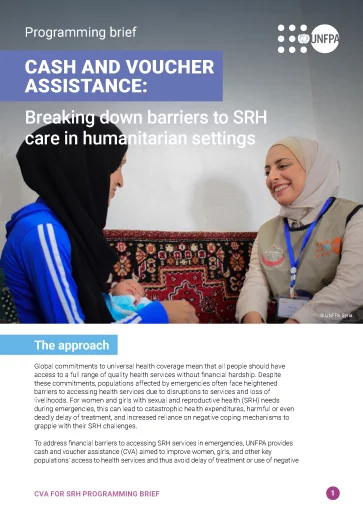Cash and Voucher Assistance: Breaking down barriers to SRH care in humanitarian settings
Global commitments to universal health coverage mean that all people should have access to a full range of quality health services without financial hardship. Despite these commitments, populations affected by emergencies often face heightened barriers to accessing health services due to disruptions to services and loss of livelihoods. For women and girls with sexual and reproductive health (SRH) needs during emergencies, this can lead to catastrophic health expenditures, harmful or even deadly delay of treatment, and increased reliance on negative coping mechanisms to grapple with their SRH challenges.
To address financial barriers to accessing SRH services in emergencies, UNFPA provides cash and voucher assistance (CVA) aimed to improve women, girls, and other key populations’ access to health services and thus avoid delay of treatment or use of negative coping mechanisms. In doing so, UNFPA lowers financial barriers to accessing SRH goods and services by addressing both the direct costs (i.e. cost of the product or service) and ancillary costs (i.e. the cost of transport to get to an SRH service, childcare costs while accessing a service, costs related to a hospital stay, etc.) of access. Through this, UNFPA has been able to enhance health-seeking behaviors and access to SRH services, ultimately contributing to safer pregnancies and childbirth and saving lives.
This brief details some of the ways that UNFPA country offices have used CVA in recent years to meet the SRH needs of women, girls, and other key populations in humanitarian contexts.



